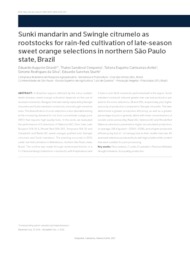Sunki mandarin and Swingle citrumelo as rootstocks for rain-fed cultivation of late-season sweet orange selections in northern São Paulo state, Brazil.
Sunki mandarin and Swingle citrumelo as rootstocks for rain-fed cultivation of late-season sweet orange selections in northern São Paulo state, Brazil.
Author(s): GIRARDI, E. A.; CERQUEIRA, T. S.; CANTUARIAS-AVILÉS, T. E.; SILVA, S. R. da; STUCHI, E. S.
Summary: In Brazilian regions affected by the citrus sudden death disease, sweet orange cultivation depends on the use of resistant rootstocks. Rangpur lime was mainly replaced by Swingle citrumelo and Sunki mandarin rootstocks, more drought-sensitive ones. The diversification of scion selections is also desirable aiming at the increasing demand for not from concentrate orange juice (NFC) that requires high-quality fruits. In this work, we evaluated the performance of 6 selections of Valencia (IAC, Dom João, Late Burjasot IVIA 35-2, Rhode Red SRA 360, Temprana IVIA 25 and Campbell) and Natal IAC sweet oranges grafted onto Swingle citrumelo and Sunki mandarin. The planting occurred in 2001 under rain-fed cultivation in Bebedouro, northern São Paulo state, Brazil. The outline was made through randomized blocks in a 7 × 2 factorial design (selections × rootstock), with 4 replications and 2 trees in unit. Both rootstocks performed well in the region. Sunki mandarin rootstock induced greater tree size and production per plant to the scion selections, 38 and 21%, respectively, plus higher precocity of production compared to Swingle citrumelo. The later determined a greater productive efficiency, as well as a greater percentage of juice in general, albeit with lower concentrations of soluble solids and acidity. Natal IAC, Valencia IAC and Rhode Red Valencia selections presented a higher accumulated production, on average, 218.6 kg?plant?1 (2004 ? 2008), and a higher productive efficiency (kg fruit?m?3 of canopy) due to their smaller tree size. All assessed selections produced fruits with high soluble solids content that were suitable for juice processing.
Publication year: 2017
Types of publication: Journal article
Unit: Embrapa Cassava & Fruits
Keywords: Citrus, Fruta cítrica
Observation
Some of Embrapa's publications are published as ePub files. To read them, use or download one of the following free software options to your computer or mobile device. Android: Google Play Books; IOS: iBooks; Windows and Linux: Calibre.
Access other publications
Access the Agricultural Research Database (BDPA) to consult Embrapa's full library collection and records.
Visit Embrapa Bookstore to purchase books and other publications sold by Embrapa.

